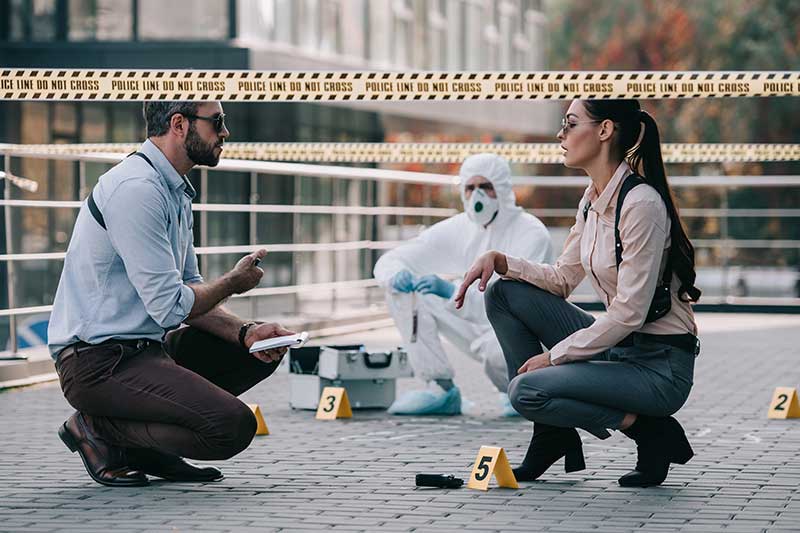Are you fascinated by the intricacies of solving crimes? Do you dream of playing a pivotal role in bringing justice to the world? If so, a career in crime scene investigation (CSI) might be the perfect path for you. In this comprehensive guide, we’ll explore various career paths within the field of CSI, providing insights and practical tips that can help criminal justice students like you pave your way to a successful and fulfilling career.
Discover Your Future in Crime Scene Investigation
Explore career opportunities in crime scene investigation. Learn the skills needed and take the first step toward your future in this exciting field today!
The World of Crime Scene Investigation
Crime scene investigation is an integral part of the criminal justice system. CSIs are responsible for meticulously gathering, preserving, and analyzing evidence from crime scenes. This evidence plays a crucial role in solving crimes and securing convictions in court. The work of a CSI ensures that justice is served and that the truth prevails.
The Importance of CSIs in the Justice System
The role of a CSI goes beyond just collecting evidence. They bridge the crime scene and the courtroom, providing critical information that can make or break a case. Their expertise in analyzing evidence helps to recreate the events surrounding a crime, offering invaluable insights to law enforcement and prosecutors.
Key Skills for Aspiring CSIs
To excel in the field of CSI, you need to possess a unique set of skills. Attention to detail is paramount, as even the smallest evidence can be crucial. Strong analytical skills allow you to interpret complex data and draw meaningful conclusions. Excellent communication skills are also essential for effectively conveying your findings to law enforcement, attorneys, and juries.
Educational Pathways to Becoming a CSI
Pursuing a career in CSI typically begins with obtaining a degree in criminal justice, forensic science, or a related field. Many universities offer specialized programs that provide the knowledge and hands-on experience needed to succeed in this field. Coursework often includes crime scene management, forensic biology, and criminal law.
Gaining Practical Experience
Beyond formal education, gaining practical experience is vital. Internships and volunteer opportunities with law enforcement agencies or forensic laboratories can provide invaluable hands-on experience. This exposure enhances your skills and helps you build a network of professional contacts that can be beneficial when seeking employment.
The Role of Forensic Science Technicians
Forensic science technicians are often the first professionals to arrive at a crime scene. They are responsible for collecting evidence, taking photographs, and documenting the scene. This role requires meticulous attention to detail and a methodical approach to ensure that all potential evidence is preserved for further analysis.
Specializations Within CSI
The field of CSI offers various specializations, allowing you to focus on areas that align with your interests and strengths. Some common specializations include forensic anthropology, forensic entomology, and digital forensics. Each specialization requires specific expertise and offers unique opportunities to contribute to the criminal justice system.
The Growing Field of Digital Forensics
With the increasing prevalence of digital technology, digital forensics has become a crucial aspect of CSI. Digital forensic experts analyze electronic devices to uncover evidence of cybercrimes, fraud, and other offenses. This specialization requires advanced knowledge of computer systems, software, and data recovery techniques.
Opportunities in Forensic Anthropology
Forensic anthropologists specialize in analyzing human remains to determine the identity and cause of death. Their expertise is often called upon in unidentified bodies or mass disasters. This field requires a deep understanding of human anatomy, osteology, and decomposition processes.
The Impact of Forensic Entomology
Forensic entomologists study insects to provide insights into the time and circumstances of a crime. They can estimate the post-mortem interval and other crucial details by analyzing insect activity on decomposing remains. This specialization combines biology and criminology, offering a unique perspective on crime scene investigation.
Career Advancement and Professional Growth
A career in CSI offers numerous opportunities for advancement. With experience and additional training, you can move into supervisory or managerial roles. Continuing education and professional certifications, such as those offered by the International Association for Identification (IAI), can further enhance your credentials and open doors to higher-level positions.
Balancing Work and Personal Life
Working as a CSI can be demanding, with irregular hours and high-stress situations. However, many professionals find the work to be incredibly rewarding. Developing strategies to manage stress and maintain a healthy work-life balance is essential for long-term success and well-being in this field.
The Future of Crime Scene Investigation
The field of CSI is continually evolving, with advancements in technology and forensic science driving new methodologies and techniques. Staying current with the latest developments and continuously honing your skills are crucial for maintaining a competitive edge and contributing to advancing justice.
Getting Started with Your CSI Career
If you’re ready to take the first step towards a career in CSI, start by researching educational programs that align with your interests. Seek out internships and volunteer opportunities to gain practical experience. Join professional organizations and attend conferences to stay informed about industry trends and build a network of like-minded professionals.
Conclusion
A career in crime scene investigation is both challenging and rewarding, offering numerous opportunities to impact the justice system significantly. By developing the necessary skills, pursuing relevant education, and gaining practical experience, you can position yourself for success in this dynamic field. Remember, the path to becoming a CSI is a journey that requires dedication, passion, and a commitment to lifelong learning. Ready to start your CSI adventure? Explore educational programs and job opportunities today, and take the first step toward a fulfilling career in crime scene investigation.





